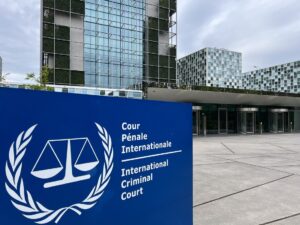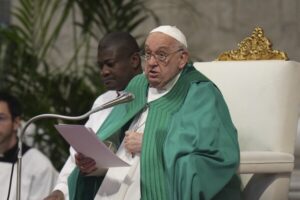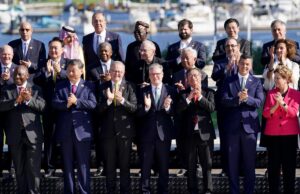
The National Interest Foundation Newsletter
Issue 262, November 22, 2024
Welcome to our NIF Newsletter. In this week’s edition, we provide analysis on the International Criminal Court (ICC) issuing arrest warrants for Israeli Prime Minister Benjamin Netanyahu and his former minister Yoav Gallant for committing war crimes and genocide, examine Pope Francis’ call for a genocide investigation in Gaza, and discuss this year’s Group of Twenty (G20) summit taking place amid an array of global challenges.
Editor: Bassam Tarbush
ICC Issues Arrest Warrants for Netanyahu and Gallant for Committing War Crimes and Genocide

The arrest warrants deepen Israel’s isolation internationally over its actions in Gaza. (Photo from Getty Images)
ICC Issues Arrest Warrants for Netanyahu and Gallant for Committing War Crimes and Genocide
By NIF Staff
Yesterday, in a notable development and historic rebuke, the International Criminal Court (ICC) formally issued arrest warrants against Israeli Prime Minister Benjamin Netanyahu and former minister Yoav Gallant who served in Israel’s cabinet until his dismissal on November 5th. The two officials are the principal architects of Israel’s ongoing and widely-criticized military offensive in Gaza, and are being charged with committing war crimes and crimes against humanity during the longstanding conflict. The ICC’s chief prosecutor, Karim Khan, had previously submitted the applications for arrest back in May, and a pre-trial chamber of judges has now stated with their ruling that they reject Israel’s appeals claiming the ICC does not have jurisdiction over the situation in Gaza as well as their attempt to try and halt the proceedings. With the issuing of the arrest warrants, the ICC has expressed that it found reasonable grounds to believe that Netanyahu and Gallant each bear criminal responsibility for the war crime of starvation as a method of warfare and for crimes against humanity through, among other things, “intentionally and knowingly depriving the civilian population in Gaza of objects indispensable to their survival, including food, water, medicine, and medical supplies, as well as fuel and electricity.” The court found that Israeli restrictions disrupted the ability of humanitarian organizations to deliver these much-needed supplies. The ICC also ruled that Netanyahu and Gallant bore potential criminal responsibility for intentionally directing attacks against the civilian population of Gaza.
The ICC’s jurisdiction is not universal – it has 125 member states, including all European Union members, the vast majority of Latin America, and much of Africa, however it does not comprise of the United States, Russia, China, and India. Israel is also not a party to the Rome Statute and disputes the court’s jurisdiction. Nevertheless, the state of Palestine joined in 2015, and therefore, the court has ruled that it has jurisdiction over crimes committed in the illegally-occupied Palestinian territories. This is why after 185 days of investigation, the court decided yesterday to officially issue the arrest warrants for Netanyahu, Gallant, and several Hamas officials. The charges against Netanyahu and Gallant of intentionally attacking civilians and, at the same, denying or limiting humanitarian aid have consistently been raised by humanitarian organizations, international bodies, and various governments, and are thus believed to have strong merit and grounds for the arrest warrants. Importantly, the ICC noted that it found no military need or other justification under international humanitarian law for the aid restrictions and that what humanitarian relief did get in was under the pressure of the global community, or in particular, the United States.
Netanyahu and Gallant are unlikely to face any immediate risk given that the ICC relies on its member states to enforce its warrants and does not have the ability to go after anyone itself, however, the warrants will significantly impact their ability to travel abroad – especially as countries like the United Kingdom, France, and Germany are all part of the ICC. Critically, France, Canada, and the Netherlands have already announced that they would comply with the arrest warrants, in light of them being issued, and the Dutch foreign minister even postponed a planned visit to Israel as a result. In addition to traveling limitations, the arrest warrants could also have diplomatic and military consequences for Israel, most notably in Europe. Some analysts have expressed that ICC member states could face internal domestic pressure to cut off diplomatic contacts with the Netanyahu government. Furthermore, the arrest warrants against Netanyahu and Gallant might also complicate weapons transfers from countries with laws that limit these in circumstances where there is credible reason to believe that they will be used to commit atrocities. This has already been seen in places like the United Kingdom and the Netherlands, and may very well become a more common occurrence.
The ICC ruling has garnered support from world leaders in Canada, France, the Netherlands, Norway, Italy, Sweden, and South Africa, amongst others who emphasized respect for international rule of law, commitments to the Rome Statute, and the fairness of the judicial process. However, enforcement of the warrants by many of these countries remains unclear. When asked whether France would arrest Netanyahu if he came to the country, French Foreign Ministry Spokesperson Christophe Lemoine stated that it would be “legally complex,” casting doubt on any possible compliance with the decision. The court order was, unsurprisingly of course, not without its critics, as some world leaders condemned the ruling – including the Biden administration and officials from Hungary, Austria, and Argentina. Despite this, European Union (EU) Foreign Policy Chief Josep Borrel stated that, “This decision is a binding decision and all state parties of the court, which include all members of the European Union, are binding to implement this court decision.” It is unknown what implications this statement will have, or more so, if the EU would mandate cooperation with the ruling, but it does demonstrate the conflict over sovereign decision-making that EU members have had in recent years.
It remains to be seen entirely how things play out in the aftermath of the arrest warrants being announced as the full fallout stemming from this is still unclear. However, the decision will undoubtedly prompt serious hesitations in the travel movements of the charged officials and the nature of various political entities’ diplomatic dealings with them, and could also bolster the basis for legal challenges regarding Israeli arms transfers to the current Netanyahu government – something that already possessed merit and had become a key point of concern in the United States and around the world. Additionally, it strengthens the long-held notion about the criminality and illegality of Israeli officials’ actions during the ongoing Gaza War, and further isolates Israel as a rogue actor on the international stage.
Pope Francis Calls for Genocide Investigation in Gaza

In a new book, Pope Francis calls for an investigation to determine if Israel’s actions in Gaza constitute genocide. (Photo from AP)
Pope Francis Calls for Genocide Investigation in Gaza
By Jake Spiller
As Israel’s devastating war in Gaza continues without an end in sight, Pope Francis – the head of the Catholic Church – has called for an investigation regarding whether what is happening in Gaza is genocide. The remarks featured in a new book written by journalist Hernán Reyes Alcaide based on interviews with the Pope titled “Hope Never Disappoints: Pilgrims Toward a Better World,” which was released on November 19th in Italy, Spain, and Latin America, and will come out in other markets at a later date. In a chapter titled “The Face of a Migrant,” Pope Francis discusses the need to always respect human dignity and praises nations that have taken in war refugees. When addressing the ongoing conflict in the Middle East, the Pope says, “According to some experts, what is happening in Gaza has the characteristics of a genocide. It should be carefully investigated to determine whether it fits into the technical definition formulated by jurists and international bodies.” These are the strongest words yet from the Papacy, marking the first time that the Pope has called for an investigation of genocide regarding Israel’s actions.
Throughout the conflict in Gaza, as well as the ongoing wars in Ukraine and Sudan, the Pope has been vocal about the need to abide by humanitarian law, allow for the free flow of aid, and prevent civilians from being harmed. Regarding the Gaza War, the Pope has been active in speaking out on the conflict since the beginning, saying in October of last year that “extremism does not help reach a solution between Israelis and Palestinians, but instead fuels hatred, violence, and revenge.” Pope Francis has presented himself as a voice of peace, calling for the release of hostages, an immediate ceasefire in Gaza, and humanitarian aid for civilians. Earlier this year, after being asked about the assassination of Hezbollah leader Hassan Nasrallah in an Israeli strike that left several residential buildings destroyed and killed at least 33 with 195 more injured, the Pope suggested that Israel’s response was immoral and disproportionate – although he did not reference Israel specifically by name. In the Vatican, the Pope has met former Israeli hostages and those with relatives still being held in Gaza on a few occasions, and he has also met with Palestinians who have lost loved ones and who have relatives stuck in Gaza.
The Pope’s recent comments align with international consensus regarding Israel’s military actions in Gaza which has increasingly drawn attention to how its actions have gone outside the rules of warfare and been comprised of egregious war crimes and human rights violations. Reputable humanitarian organizations, including Amnesty International and Save the Children, among others, point to the reprehensible levels of destruction across Gaza and the dire humanitarian crisis. Journalist Hernán Reyes Alcaide, the book’s author, has noted that the Pope is not taking a stand on whether or not Israel is or has committed genocide but he is calling for an investigation to take place – given the widespread reporting of destruction, killing of civilians, and the obstruction of aid from reaching those who are in desperate need of it. Simply calling for an investigation should not be considered controversial. Israel is facing an ongoing case at the International Court of Justice (ICJ) brought by South Africa which provides evidence that Israel – through its actions of mass destruction, targeting of civilian infrastructure, hindrance of humanitarian aid, and use of starvation as a weapon of war – is committing genocide in the Gaza Strip. While the court has yet to make a final ruling, it did state earlier this year that Israel must enact provisional measures based on the credibility of the charges. In a separate case at the International Criminal Court (ICC), the body has now issued arrest warrants for Israeli Prime Minister Benjamin Netanyahu and his former minister Yoav Gallant noting reasonable grounds that they bear criminal responsibility for the use of starvation of civilians as a method of warfare. The Israeli obstruction of humanitarian aid and use of starvation as a method of warfare are concerns that human rights groups have consistently been seeking to shed light on since the onset of the war.
Pope Francis is the leader of over 1.3 billion Catholics worldwide, so his call for an investigation is a noteworthy development. In recent months, the situation on the ground in Gaza has only worsened due to the relentless devastation caused by Israel’s bombardment. The Pope’s comments add to the growing global scrutiny regarding Israel’s actions in Gaza and may apply increased pressure to put an end to its destructive military operations at a time when this is already continuing to mount around the world.
G20 Summit Takes Place Amid Array of Global Challenges

U.S. President Biden was among a few individuals who missed the initial photo of world leaders at the summit due to what was called “logistical issues” before being included in a later retake. (Photo from AFP)
G20 Summit Takes Place Amid Array of Global Challenges
By Daniel Imbornoni
On Monday and Tuesday of this week, the 2024 Group of Twenty (G20) summit was held in Brazil amid a slew of ongoing global challenges and crises. The forum was expected to be more uneventful than those in years past, due to participants’ reservations regarding new commitments in the midst of the longstanding conflicts in Ukraine and Gaza, as well as increasing U.S.-China competition. The annual gathering was led by Brazilian President Lula, who sought to garner support for his proposed global humanitarian programs focused on combating world hunger and poverty, while also advocating for gender equality and green policies. A skilled diplomat, Lula carefully conceived of a global humanitarian message that exemplified Brazil’s traditional conduct of non-alignment within the international community. Analysts noted Lula’s contrast with former Brazilian President Jair Bolsonaro, who played a less active role at these international forums, and tended towards more explicit alignment with the United States and its allies. Though, Brazil’s international alignment under both leaders has been marked by its consistent ambiguity. Bolsonaro refused to condemn Putin following his invasion of Ukraine in February of 2022. A departure from non-alignment at this event would have been inconsistent with the Brazilian status quo, as Cristiane Lucena Carneiro, an international relations professor at the University of Sao Paulo noted, “Brazilian diplomacy has been strongly engaged in this task, but to expect a substantively strong and consensual declaration in a year like 2024 with two serious international conflicts is to set the bar very high.”
This year’s G20 declaration was fraught with neutral language that emphasized, above all, a united commitment to combat humanitarian issues throughout the world. It included strong pledges of support to eradicate poverty and hunger, as Lula launched the “Global Alliance Against Hunger and Poverty” on Monday. G20 leaders recognized the need for large-scale financing to implement green policies in low-income countries, but did not mention a transition away from fossil fuels. Creon Butler, Director of the Global Economy and Finance Program at Chatham House cast doubt on these efforts stating that, “Because of the economic stress that advanced economies are under and the debt taken on during the pandemic, the likelihood of a steep change in amounts of international public finance for climate action is pretty unlikely.” Lula sought support from G20 leaders who agreed to ensure ultra wealthy individuals are effectively taxed, but failed to reach a binding agreement regarding implementation. Advocates have stated that this tax money could be used to finance these global humanitarian efforts, but an implementation of this proposal is unlikely to occur, due to tax law being a heavily national-level issue.
While the documents called for a response to the humanitarian crises that have resulted from Russia’s invasion of Ukraine and Israel’s actions in Gaza, the omission of condemnatory language was apparent. German Chancellor Olaf Scholz commented, “It is too little when the G20 cannot find the words to make it clear that Russia is responsible [for the war in Ukraine]. It’s not what I would have liked.” Putin was absent from this year’s summit, stating that he would “wreck” the meeting; a statement that came after Ukraine had urged ICC member Brazil to arrest Putin should he arrive.
Numerous world leaders had indicated a pragmatic shift in relations with China, in an effort to boost their economies. British Prime Minister Keir Starmer met with Chinese President Xi Jinping on Monday, indicating that he would like to reopen a channel for dialogue, having been noted for his interest in increased economic cooperation with China in order to revive the economy. Starmer was met with criticism for his hesitation to condemn Chinese officials for sentencing 45 pro-democracy figures this past week, replying “It’s about getting the balance right and that’s why I took a pragmatic approach in the interests of this country to further our interests and have frank discussions where they are necessary.” Despite previous pledges to avoid working with communist officials, Argentinian President Milei spoke with President Xi as well, focusing on commitments to increase economic cooperation. In general, Latin America has been increasingly shifting towards China. Roughly a week ago at the Asia-Pacific Economic Cooperation Summit (APEC) held in Peru, U.S. President Biden announced a $65 million deal to provide Black Hawk helicopters for anti-drug programs. Meanwhile, at the same time, Chinese President Xi then sent a delegation of several hundred business persons to inaugurate the first phase of a $3.5 billion shipping port seeking to increase trade volume.
To some observers, President Biden’s appearance at recent international events has become predominantly superficial since Former President Trump won the U.S. presidential election a little over two weeks ago. This is because a sentiment exists that the current Biden administration’s commitments could likely be rendered ineffective upon the imminent arrival of the incoming second Trump administration. Thus, it appears as though various countries around the world have been reevaluating and revitalizing their foreign policy in an attempt to prepare for the new U.S. presidency – with some attempting to court favor whilst others engage in a shift away from the United States as a result.
